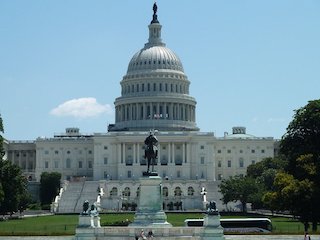House leaders crafted a bipartisan plan to streamline FCC satellite approvals while also addressing safety and national security concerns around an increase in orbital activity. The move comes as SpaceX is ready to dramatically expand the amount of broadband-delivery satellites in its growing Starlink constellation.
House Energy and Commerce Committee Chairman Frank Pallone (D-NJ) and Ranking Member Cathy McMorris Rodgers (R-OR) released two draft bills — the SAT Streamlining Act and the Secure Space Act. Together, they would update and speed how the FCC authorizes secure low-earth orbit satellites.
“We must streamline our regulatory processes to usher in a new era of American innovation and investment in this growing sector, particularly as our economic competitors like China race to dominate this industry,” Pallone and McMorris Rodgers stated. With these discussion drafts, Republicans and Democrats are beginning what they call a “robust” process on these objectives and seek feedback from all interested stakeholders.
The discussion drafts of the bills work toward promoting responsible space management, incentivizing investment and innovation, and advancing U.S. leadership in next-generation, satellite communications networks. The Satellite and Telecommunications Streamlining Act would require the FCC to develop performance requirements, space safety and orbital debris requirements for satellite licenses. It shortens the process for changing existing licenses, such as replacing one satellite in an existing constellation — while also requiring stricter Commission review of a proposed project’s potential to cause collisions or generate space debris. It would give the agency a year to act on an application for a constellation of satellites and earth stations and 180 days to act on a renewal.
The Secure Space Act addresses national security issues. It would amend the Secure Trusted Communications Networks Act to prohibit the FCC from granting a license for satellite constellations “if the license or grant of market access would be held or controlled by an entity that produces or provides any covered communications equipment or service or an affiliate of such an entity, and for other purposes.” Covered communications or services — particularly tech tied to Chinese companies ZTE and Huawei — are ones the government has determined pose a threat to the supply chain and national security.
The draft bills earned praise from FCC Chairwoman Jessica Rosenworcel and Commissioner Brendan Carr. Rosenworcel said late Friday: “We have entered a new era in satellite communications,” adding that current laws “were written to address a different satellite ecosystem.” Carr claimed the measures will “strengthen America’s space-based leadership.”
The action comes as SpaceX has been seeking to expand its constellation of Starlink satellites, which the company hopes will deliver broadband internet to hard-to-reach regions around the world. Last week, Inside Towers reported the National Telecommunications and Information Administration sent a letter to the FCC on behalf of NASA, questioning SpaceX’s plan to create a 30,000-satellite constellation. The company currently has FCC authorization for less than 5,000 satellites.
By Leslie Stimson, Inside Towers Washington Bureau Chief





Reader Interactions